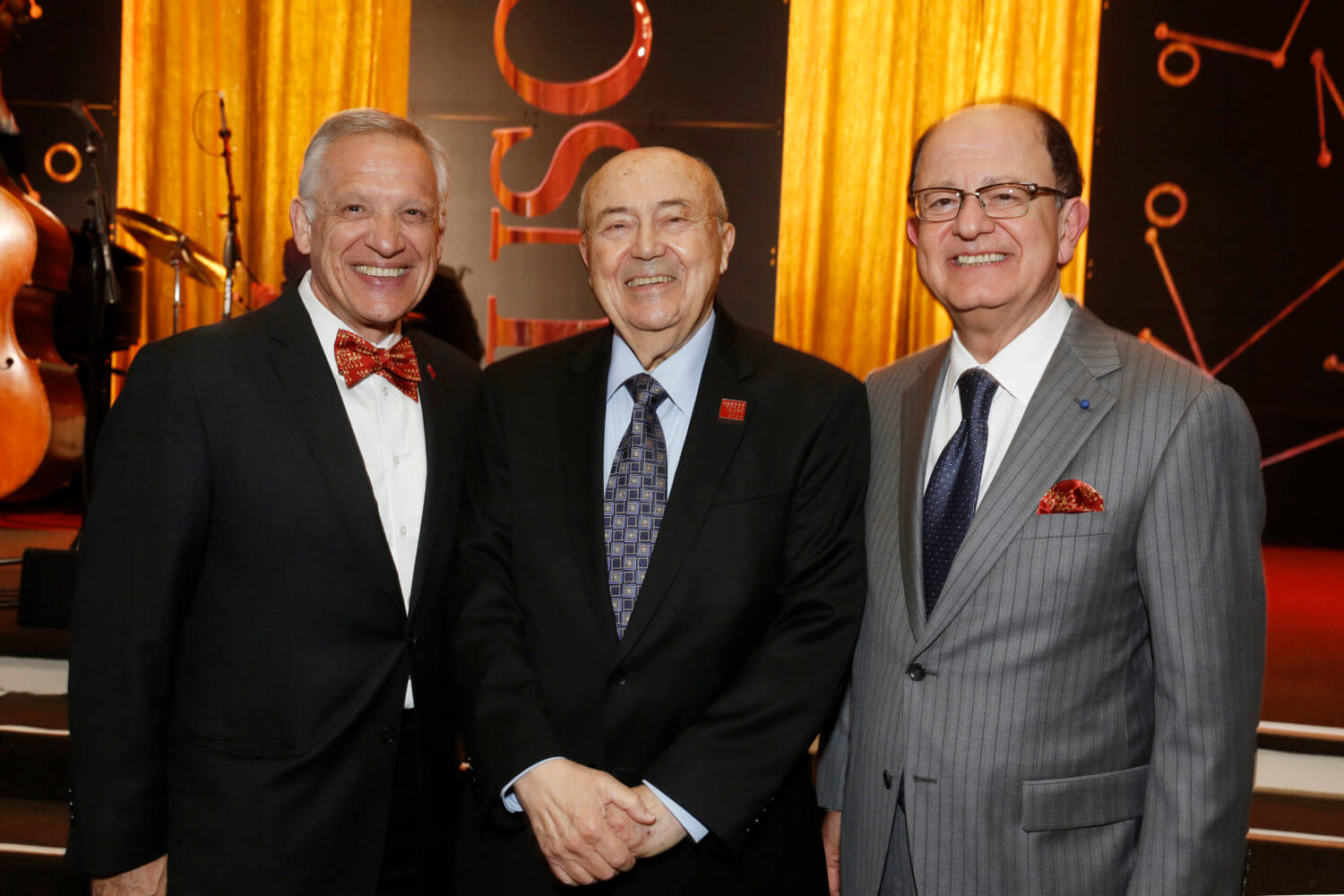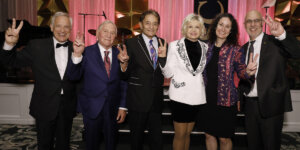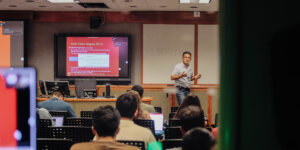
USC Viterbi Dean Yannis C. Yortsos, Dr. Andrew Viterbi and USC President C.L. Max Nikias at USC’s 39th Annual Viterbi Awards in Beverly Hills. Photo/Steve Cohn
At the 39th annual Viterbi Awards, the engineering school celebrated a momentous occasion: the 50th anniversary of the Viterbi Algorithm, which has revolutionized telecommunications by eliminating background noise.
USC President C.L. Max Nikias honored alumnus Andrew Viterbi’s legacy (Ph.D. ’62), recounting his transformation from a young immigrant into a leader, innovator and generous spirit.
“In very real ways, he brings the world together every second of every day,” said Nikias. “Like the algorithm we celebrate tonight, he has been able to break through life’s noise to focus on the right stuff—whether it be his students, his friends or his family.”
Dr. Viterbi took the stage to a standing ovation and humbly accepted the honor.
“To say that I’m overwhelmed is an understatement,” he said. “I never thought I would have so many distinguished admirers.”
“You see, in the era of artificial intelligence, even algorithms celebrate anniversaries,” joked USC Viterbi Dean Yannis C. Yortsos.
The April 19 event, which welcomed more than 500 guests to the Beverly Wilshire Hotel, also honored industry and alumni leaders.
Harel Kodesh was honored with the Daniel J. Epstein Engineering Management Award; Lieutenant General Stayce D. Harris (B.S. ISE ’81) received the Mark. A Stevens Distinguished Alumni Award; and the Global Leadership in Engineering Award was awarded to William Wang (B.S. EE ’86).
Kodesh, recipient of the Daniel J. Epstein Engineering Management Award, is chief technology officer for GE Digital and vice president of Predix, GE’s cloud platform for the Industrial Internet. A driver of technical strategy and operations at the company, he was also nominated to GE’s Corporate Executive Council in 2015.
Prior to joining GE, Kodesh served as CEO of Wingcast, a Ford Motor Company-Qualcomm joint venture; chief product officer at Amdocs; and co-founder and CEO of Nurego, a spinoff of EMC Corp. He has also held key leadership positions at Microsoft, including vice president of the Information Appliances Division, where he led development of the Windows Mobile operating system.
Kodesh sits on the USC Viterbi Board of Councilors.
Harris, who was honored with the Mark A. Stevens Distinguished Alumni Award, is the assistant vice chief of staff and director of the air staff for the Headquarters U.S. Air Force. She also serves as the deputy chairman of the Air Force Council. Harris is the first African American to achieve the rank of Lieutenant General in the U.S. Air Force.
After completing her B.S. degree in Industrial and Systems Engineering at USC’s Viterbi School through USC’s Detachment 060 AFROTC program, Harris began her Air Force career as a civil engineer. She then completed pilot training, flew the C-141 (cargo/transport aircraft) during active duty and ultimately joined the Air Force Reserve.

Lieutenant General Stayce D. Harris, winner of the 2017 Mark A. Stevens Distinguished Alumni Award, fighting on as the USC marching band closes the 39th annual Viterbi Awards. Photo/Steve Cohn
Since 1991, Harris has worked full-time as a pilot for United Airlines and commanded countless operations for the Air Force Reserve. To further her passion for community service and mentoring youth, she maintains active affiliations with the USC Black Alumni Association and the National Society of Black Engineers, as well as several other engineering and military groups.
Wang, recipient of the Global Leadership in Engineering Award, is the founder and CEO of VIZIO. His vision of designing affordable and high-quality plasma and LCD technologies has blossomed into one of America’s leading HDTV brands.
After emigrating as a child from Taipei, Taiwan to the U.S., Wang graduated from USC’s Viterbi School with a B.S. in Electrical Engineering. He then launched two companies specializing in monitors, MAG Innovision and Princeton Graphic Systems, before founding VIZIO in 2002.
Wang’s personal accolades include Forbes’ 25 Most Notable Chinese Americans as well as Entrepreneur of the Year honors from Ernst & Young, Chapman University and the Orange County Business Journal. He sits on the boards of the Segerstrom Center for the Arts and the Tim Salmon Foundation.
The event also highlighted the winners of two flagship business model competitions: the Maseeh Entrepreneurship Prize Competition (MEPC) and the Min Family Engineering Social Entrepreneurship Challenge.
With more than $100,000 in prizes on the line, 17 teams competed fiercely for the top MEPC honor. The MEPC grand prizewinner scored a $50,000 grant as well as $20,000 in free legal services. Three runners-up also won a collective $30,000 in legal fees. All competing teams received $2,500 “I-Corps” mini-grants from the NSF to conduct customer discovery.
The winning business model, Thermal View Monitoring, is an image guidance system that gives surgeons a real-time, 3-D temperature map they can use to identify cancerous cells during thermal ablation therapy. Designed by a team of engineering students and faculty, including USC Viterbi professor of electrical engineering Mahta Moghaddam, the technology uses radio frequency waves to replace MRI, CT and ultrasounds, saving physicians valuable time and money.
Now in its seventh year, the MEPC was launched by a $1 million endowment from its namesake, Fairborz Maseeh, with the goal of instilling entrepreneurial skills in engineers.
“We want engineers to be leaders in taking their technology to the market, rather than relying on others to do so,” said Peter Beerel, USC Viterbi professor and MEPC director.
The young entrepreneurs spent the spring semester learning about customer discovery, intellectual property and most importantly, how to deliver an effective business pitch.
“Through the process of customer discovery in this competition, now we know there is actual demand for our technology. It feels great,” said Sang Cho, a USC Ph.D. student in health and economics and an executive of Thermal View Monitoring, just after accepting the award.
Like the MEPC, the Min Family Challenge highlights engineering business concepts, but the award also requires startups to generate technologies that bestow a clear social benefit. Launched in 2016 by a generous gift from Bryan Min (B.S. ISE ’86), his wife Julie and their family, the award honors the top two teams with a collective $35,000 plus free legal services.
This year’s grand prize winner, HonestFi, partners with NGOs, small businesses and community members to reduce the cost of banking transactions for those under financial strain. Using a secure mobile app, the company assists low-income customers by offering services such as check-cashing, prepaid cards and automated bill pay without imposing crippling fees and interest rates.
Dean Yortsos’ closing remarks highlighted USC Viterbi’s contributions to the field of engineering and the world beyond.
“‘There will always be problems. But all problems are solvable through science and engineering,'” he said, quoting quantum physicist David Deutsch. “It is this mindset that must characterize the new engineers—and it is a mindset we wholeheartedly embrace.”
View a Flickr album of the event
Published on April 25th, 2017
Last updated on February 11th, 2021










